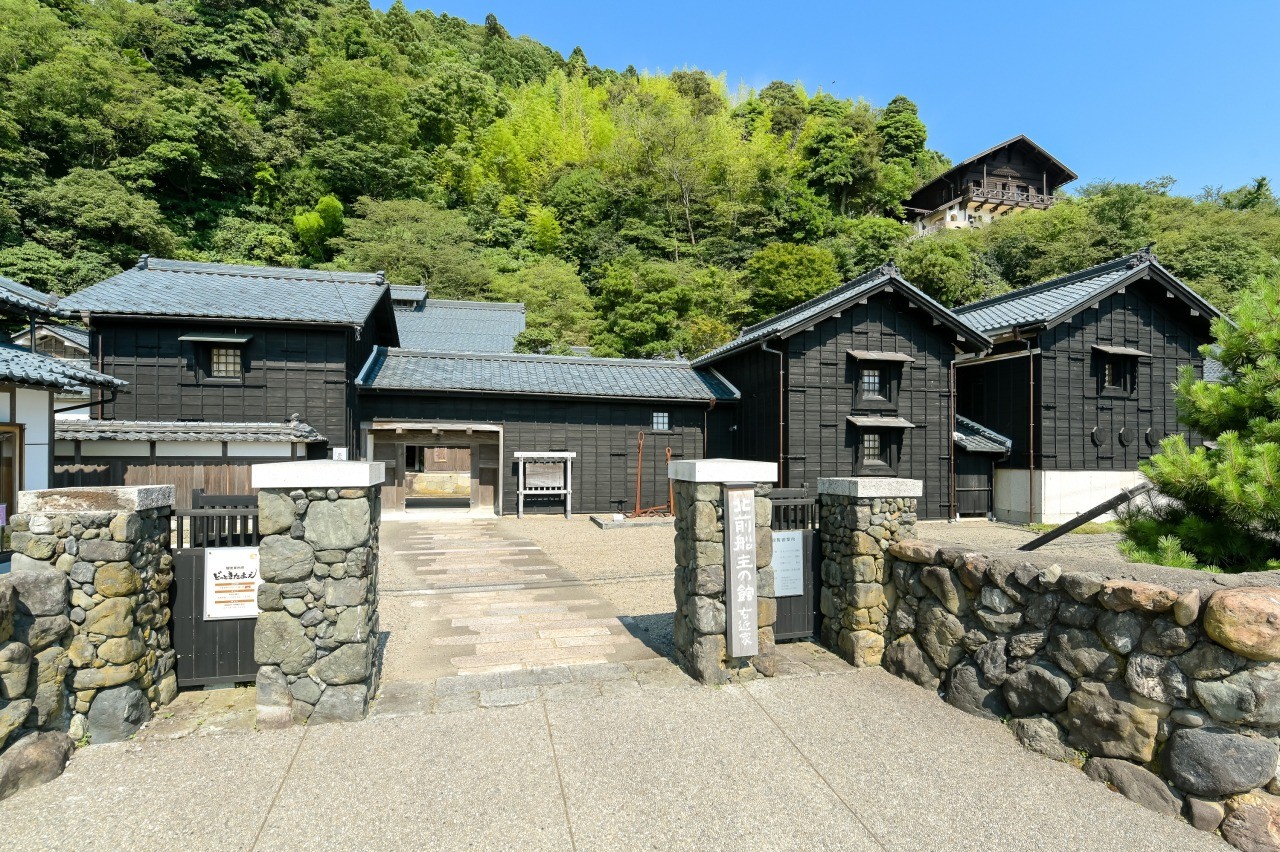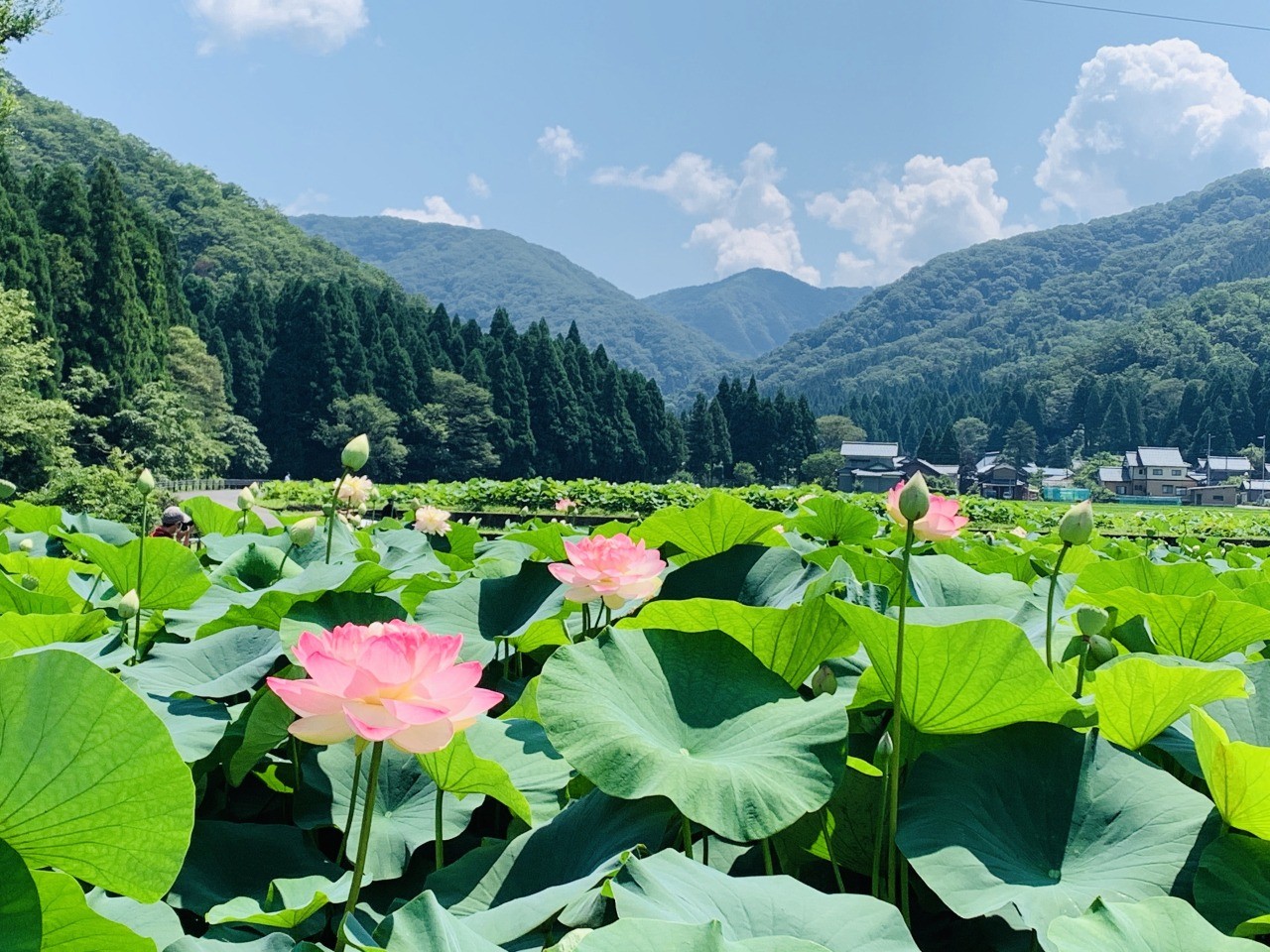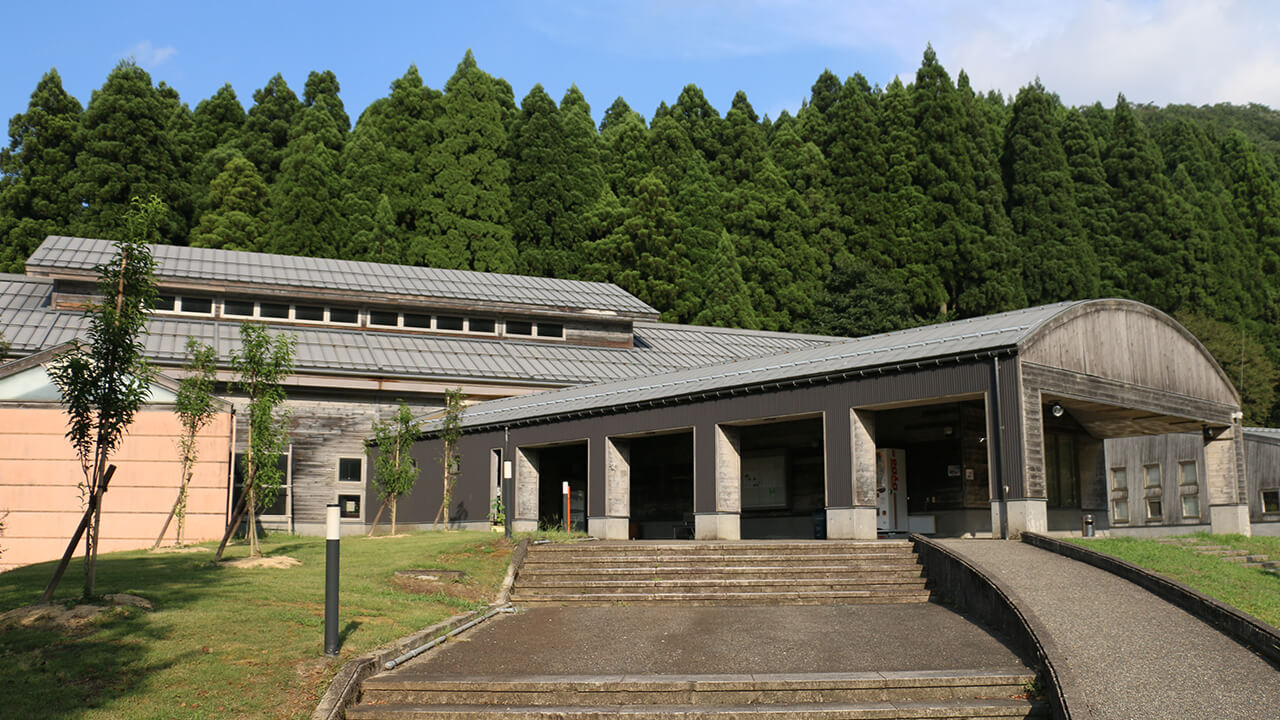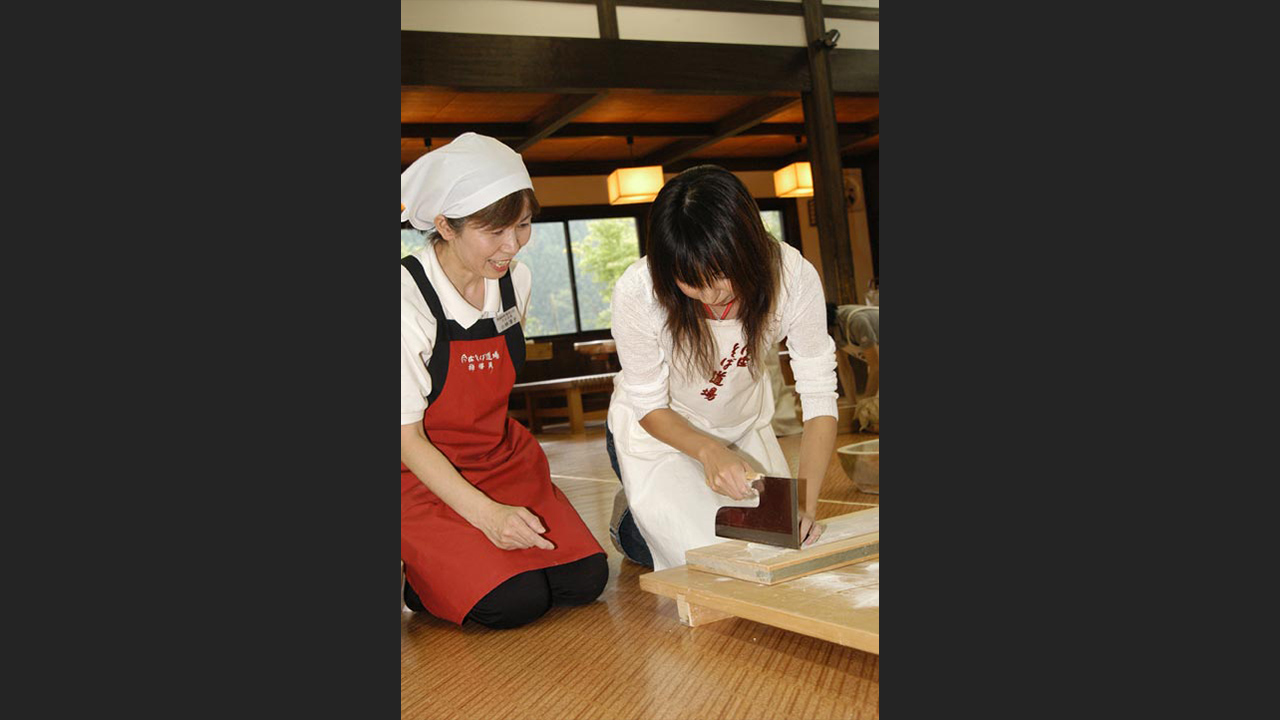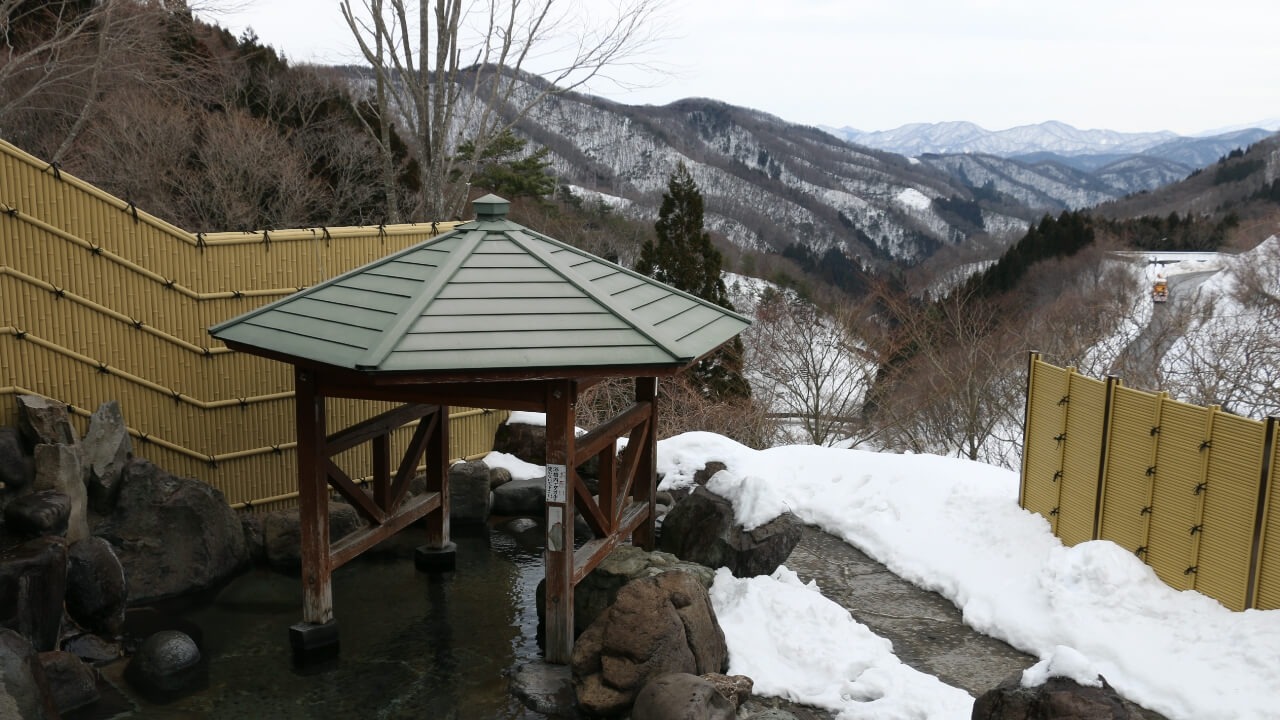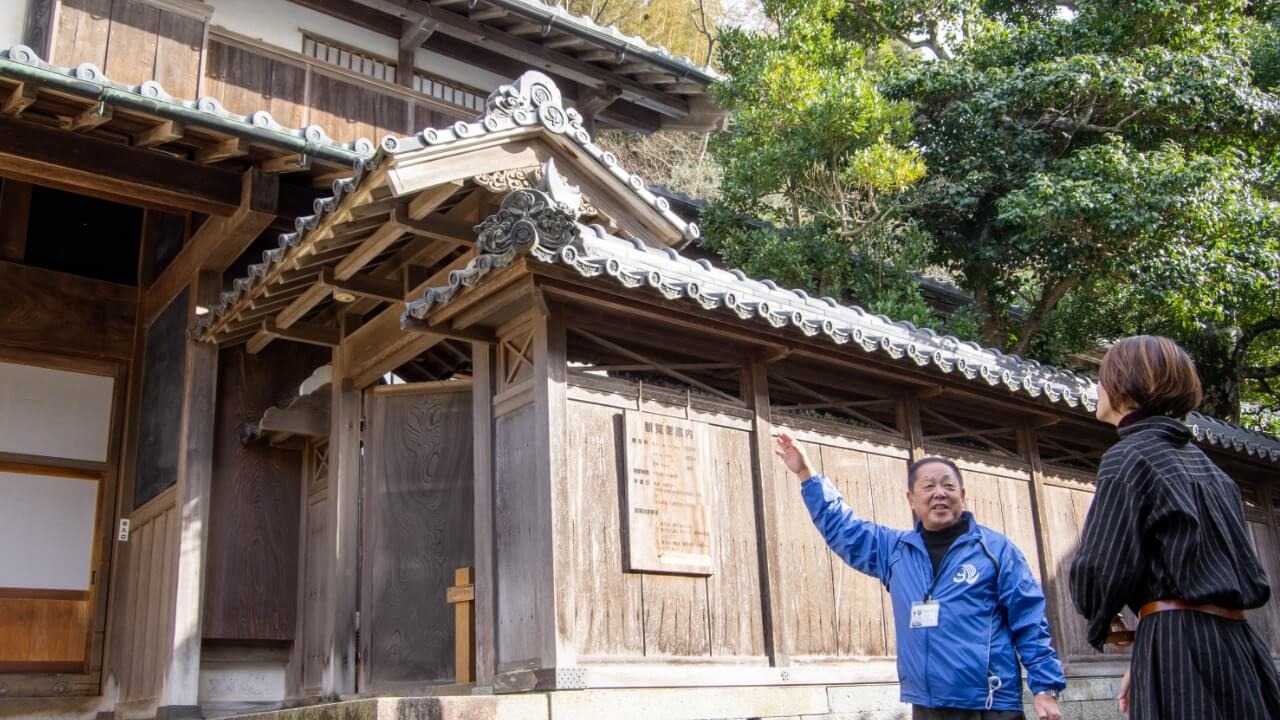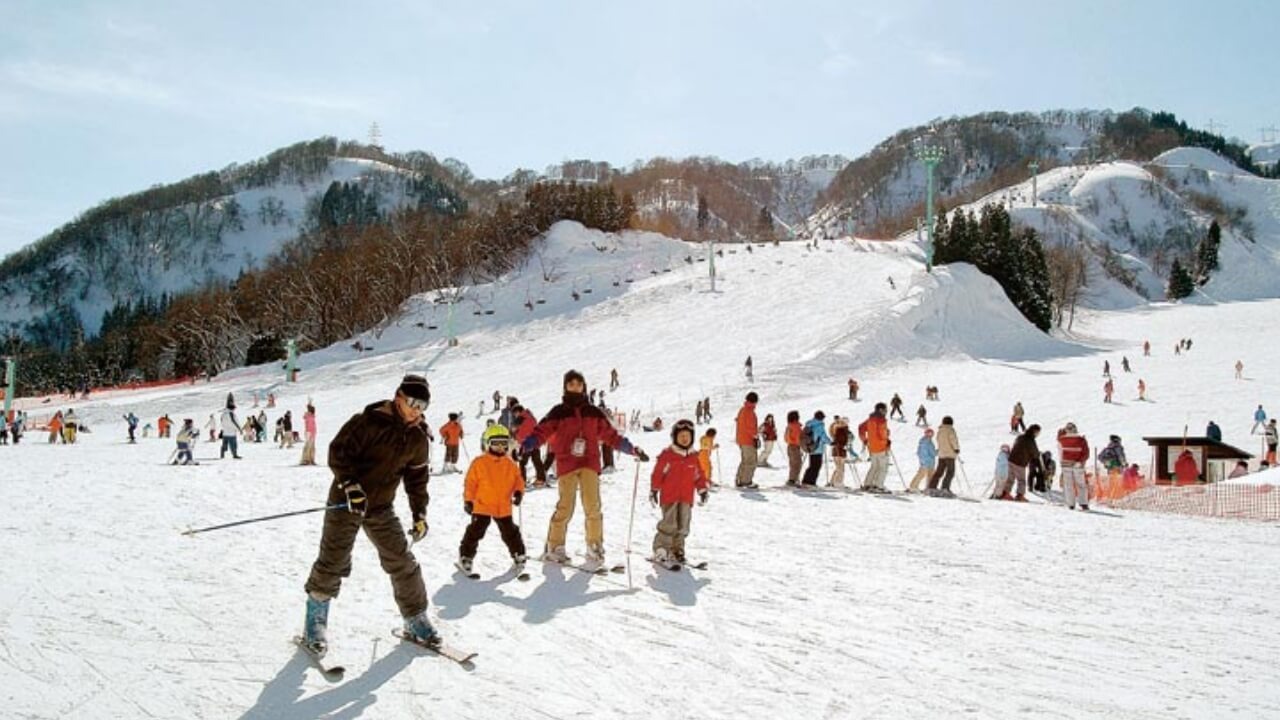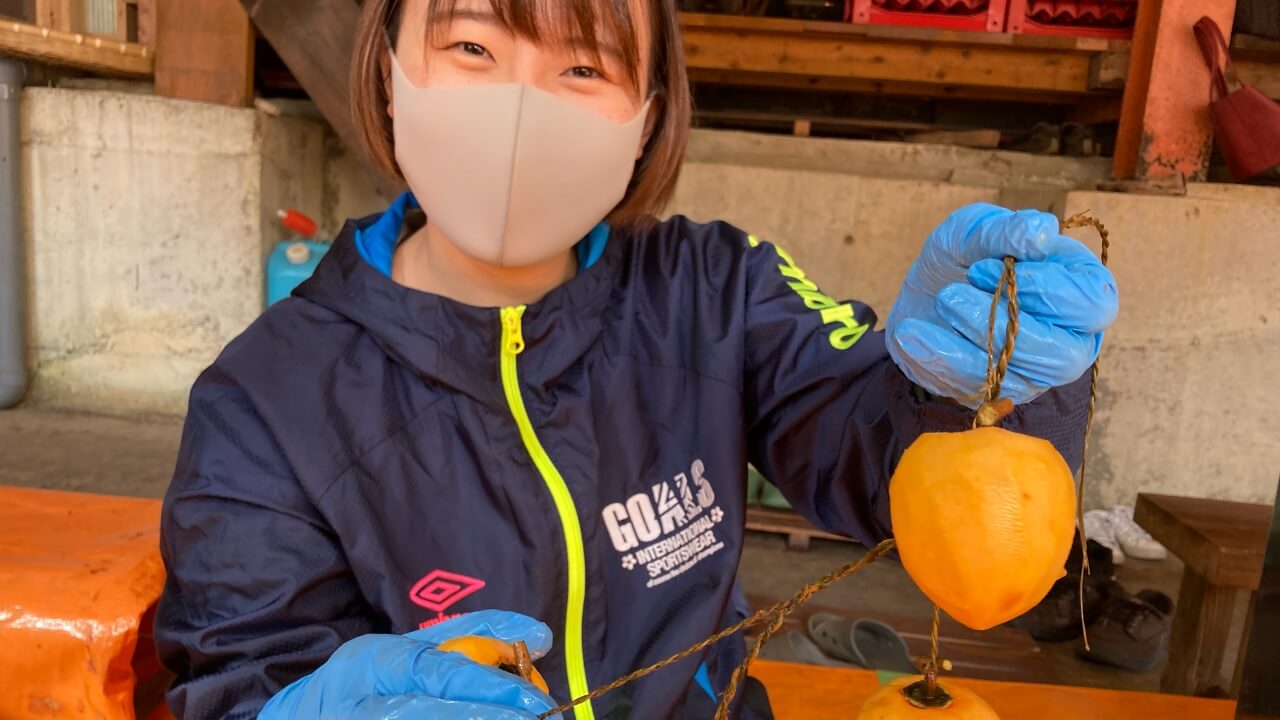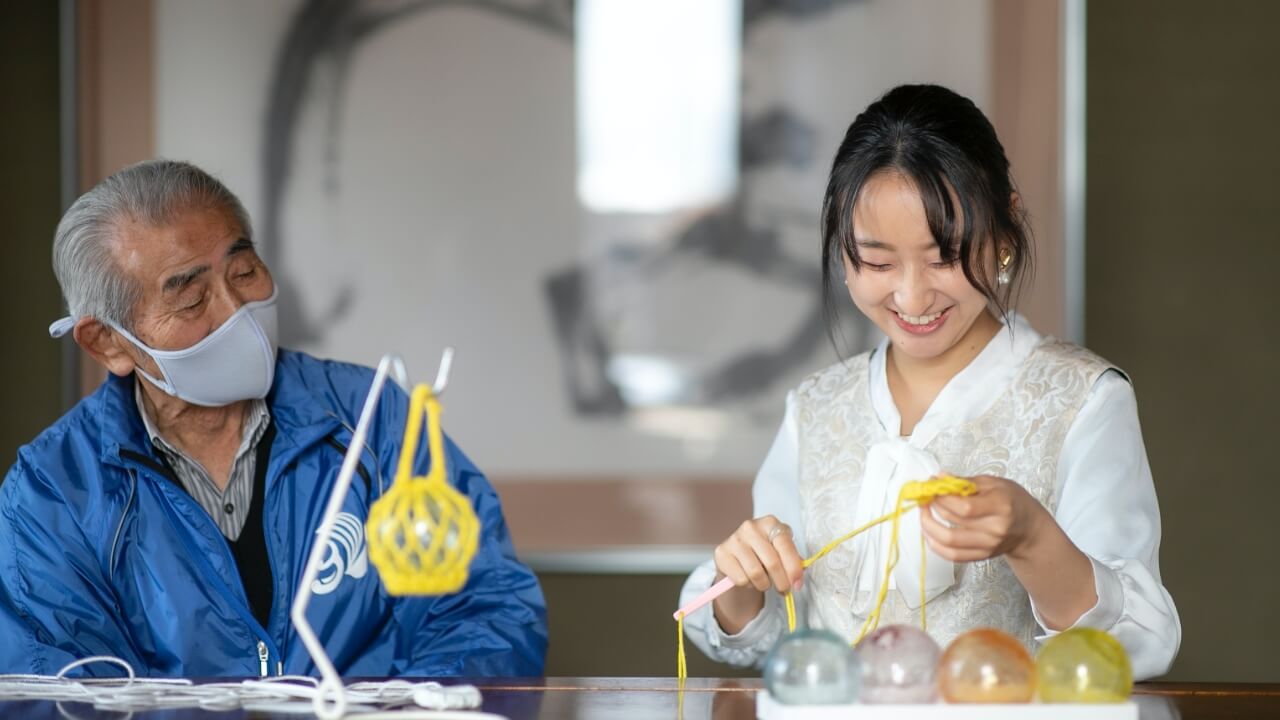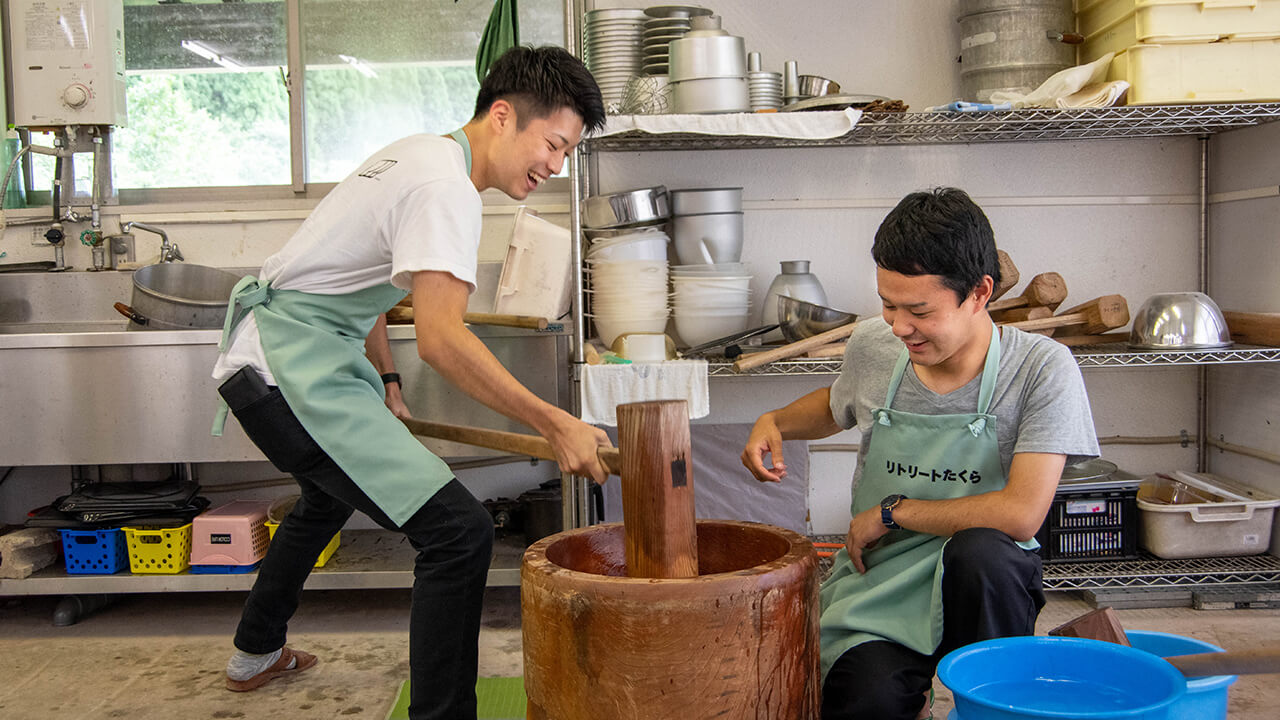Visit, Eat, Drink and Rejuvenate! A Slow, Mini Fermentation Tour of Imajo-shuku
Posted on :
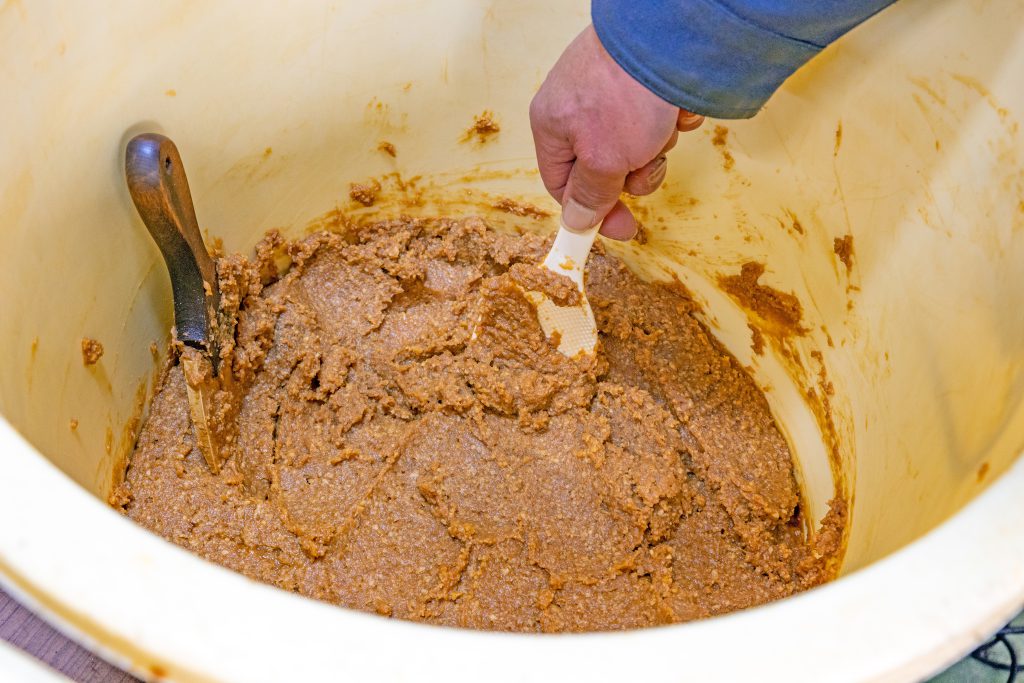
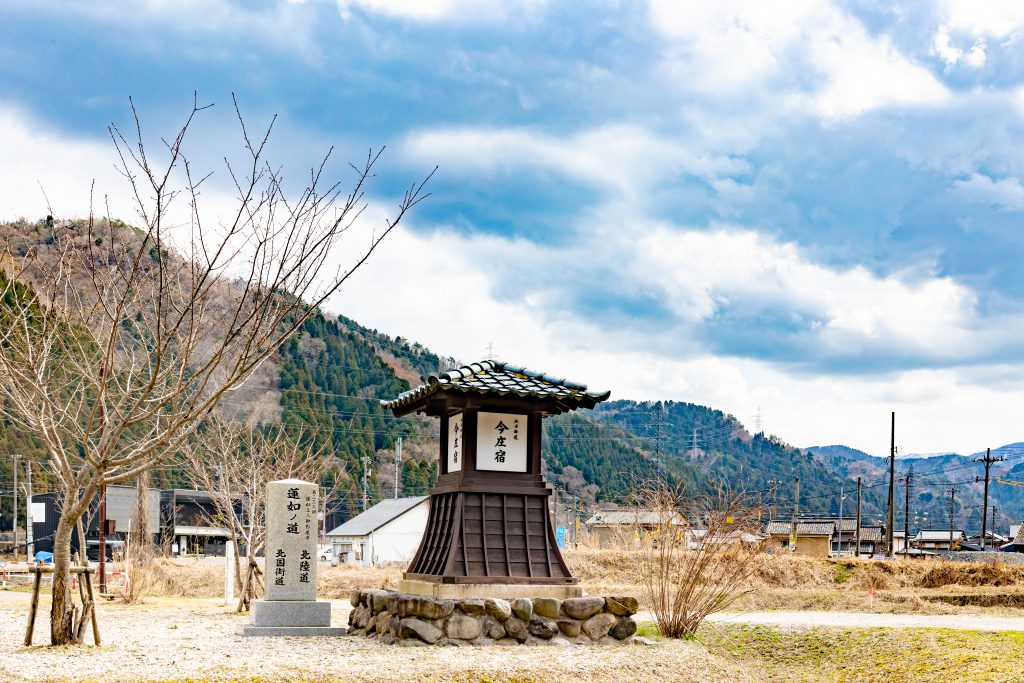
The Imajo district of Minami-Echizen in Fukui Prefecture has long been a key transportation hub, and during the Edo period it flourished as a post town along the Hokkoku Kaido road, attracting travelers traveling between the Hokuriku region and Kyoto and Edo.
The many rolling peaks of the Nanjo Mountains are the most difficult to traverse in the Hokuriku region, and every mountain pass goes through Imajo. Travelers would stop at Imajo-shuku to refresh their body and mind before crossing the mountain passes.
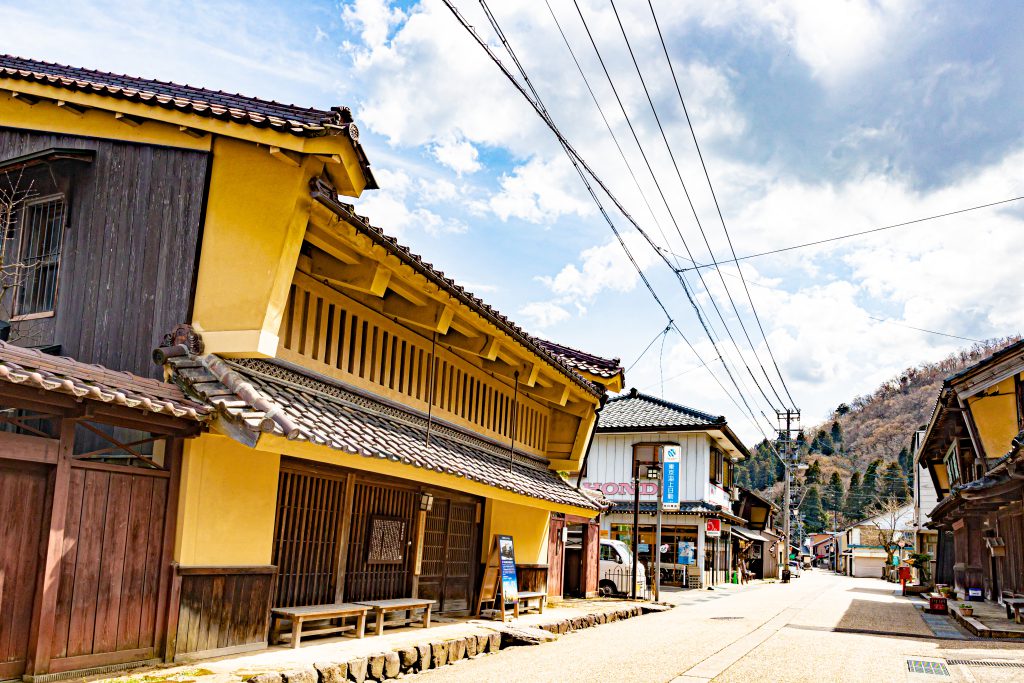
Along the road kilometer-long stretch of road, you will find historic townhouses, merchant houses, inns, and sake breweries that still stand to this day, painting a charming and quaint landscape. Take a walk that transports you back in time to the Edo period.
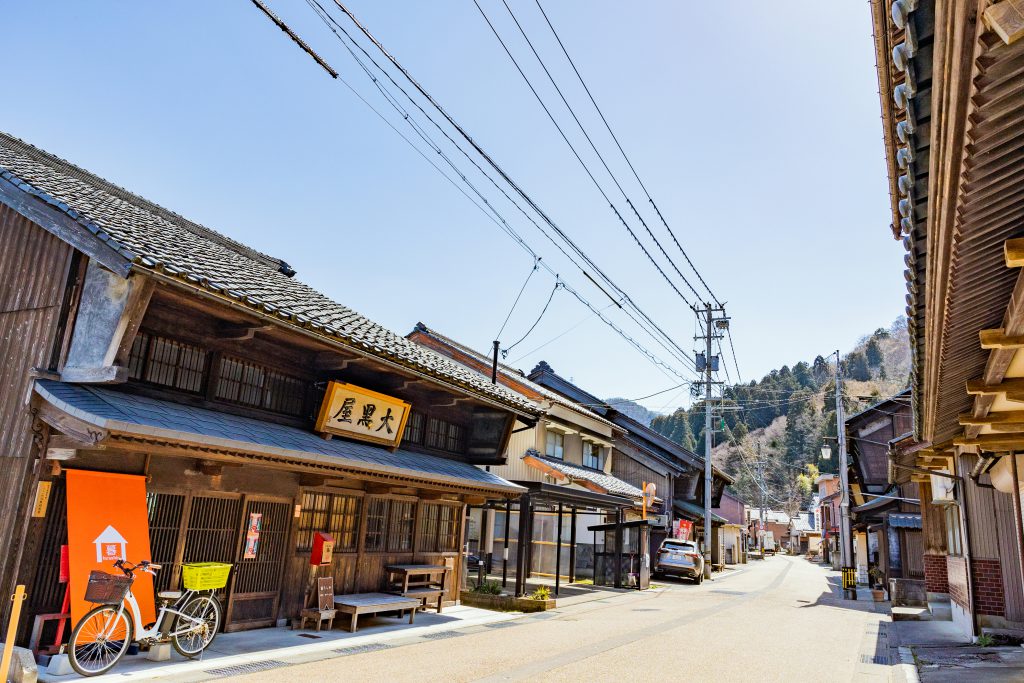
Imajo is nestled in a mountain basin far from the sea, the Hino River meanders through the center of the town, and vibrant nature can be found in every direction. The culture of fermented food here is ancient, birthed and nurtured by its climate and topography, as well as from the wisdom of its ancestors. Sake, miso, and other products have a long and deep connection here.
Allow us to present to you a selection of fermented delicacies from Imajo-shuku. Of course, nothing will beat going and touring the establishments that produce and sell these treats yourself, however, where you can learn, have fun, and savor the delicious food that will satisfy both body and soul.
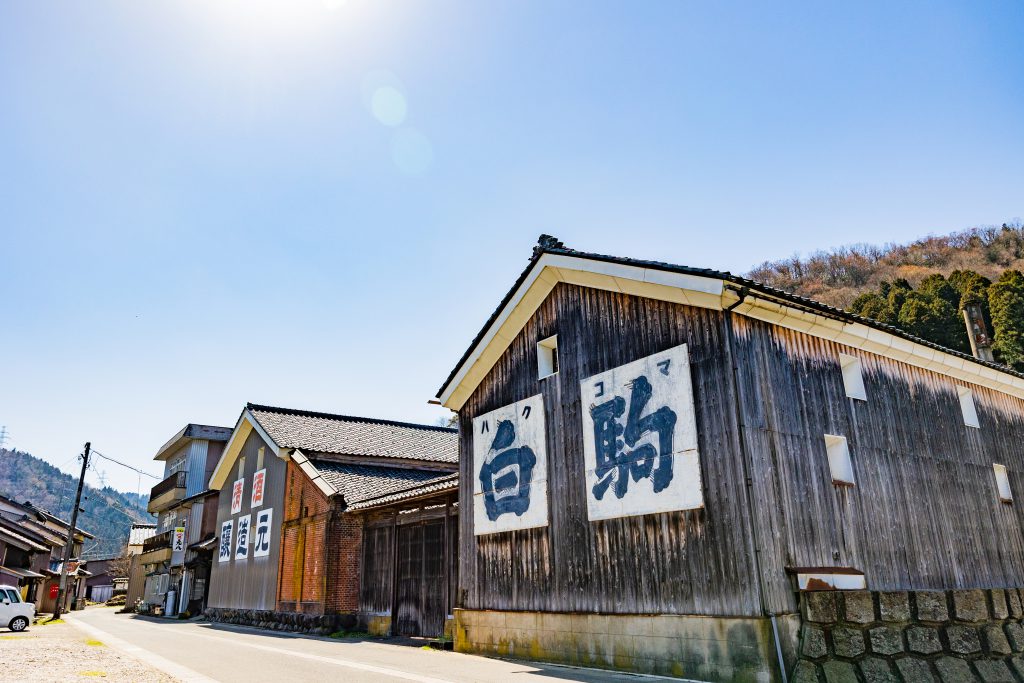
Now, let’s enjoy a little fermentation journey.
First up, we’ll start by touring some long-established sake breweries.
Snowy Imajo is blessed with a cold climate, clean air, high-quality rice, and clear spring water pouring from the mountains, making it the perfect place for creating delicious fermented foods. This ideal environment–this land, these establishments, and these artisans’ hands–produces fine sake like nowhere else. When Imajo-shuku flourished as a post town, this sake wetted the whistles of travelers coming and going on the highway, and has been beloved by the locals throughout the ages.
At one point there were fifteen different brewers lining the street, but now only four remain, offering a wide variety of unique and delicious sakes.
Hatakeyama Sake Brewery: A Sake Brewery Where the Blessings of Fukui Gather
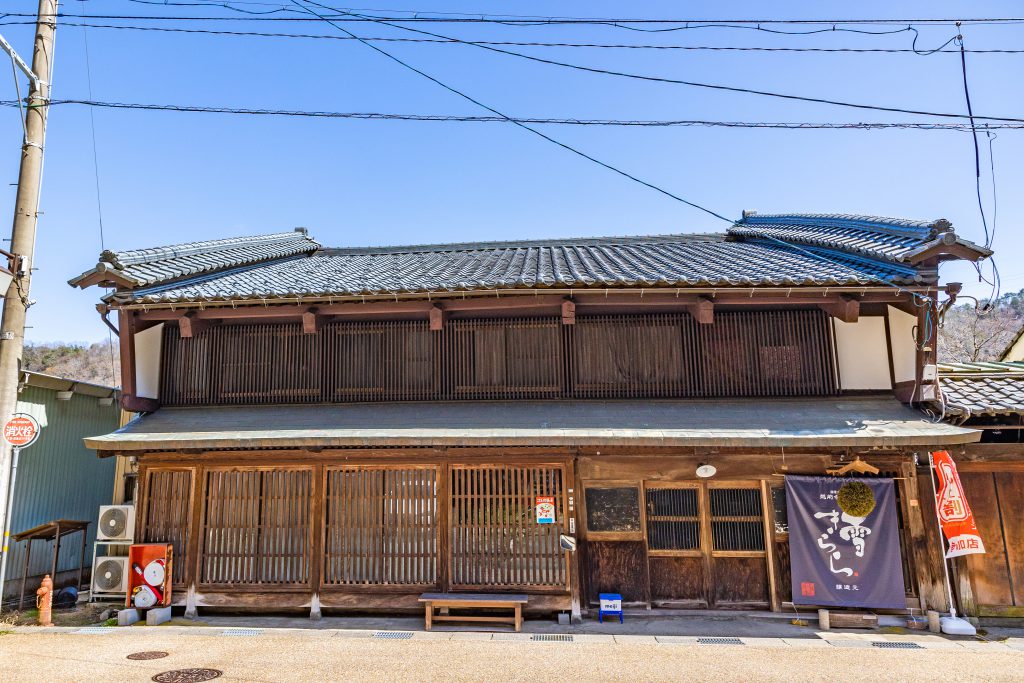
Hometown Sake Brewed with Nature and Labor
Hatakeyama Sake Brewery, founded in 1835, produces local sakes such as Yuki Kirara, Hyakkibune, and Chie no Mizu. Its history is said to date from when the owner of an inn began serving homemade nigori sake to guests. This locally-oriented brewery is committed to producing fine, handmade sake with groundwater from the Hino River, Imajo rice ideal for making sake, and yeast from Fukui. It has won the awards at a sake tasting competitions for five consecutive years.
The key to the flavor is in making the koji. We leave it up to fate and trust in the power of nature, says Takuya Hatakeyama, the 11th generation master brewer.
The climate unique to this basin, with its hot summers and cold winters, is probably ideal for sake brewing. The harsh cold stimulates the yeast that lives in the brewery to ferment, allowing for the mysterious process of turning rice into sake to be repeated over and over again, he says.
The snow falls heavy in Imajo, so their representative sake, Yuki Kirara, was named after it. It is a sake that truly reflects the region’s climate and topography. Don’t miss it if you visit Imajo-shuku.
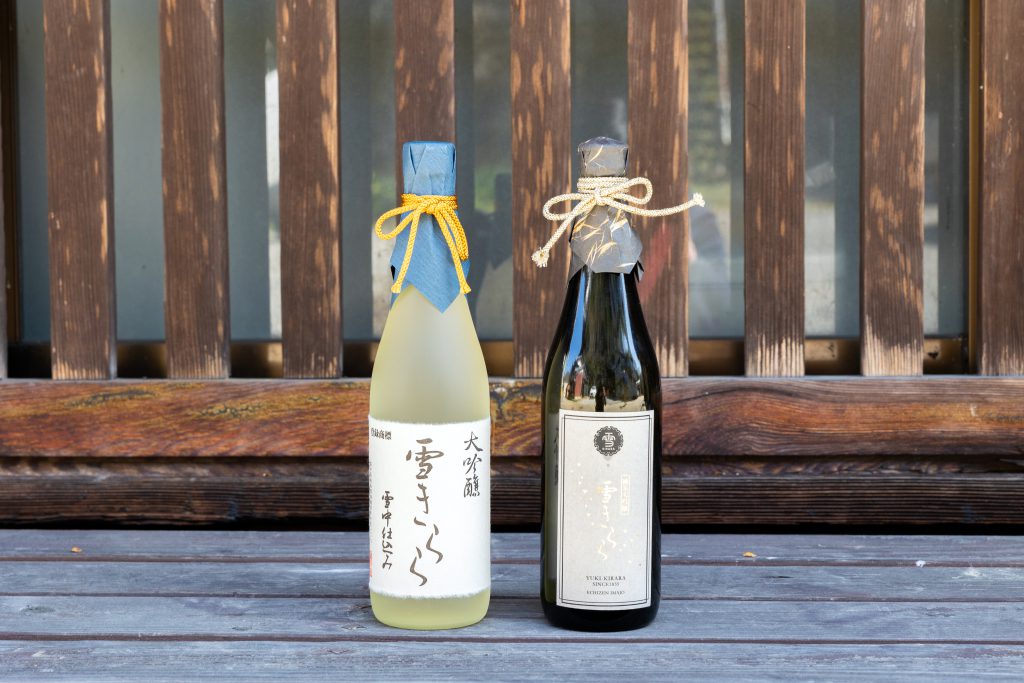
Yuki Kirara has a gorgeous aroma and a light, elegant taste. This fine junmai has a rich flavor that spreads in your mouth and leaves a clean, mild aftertaste.
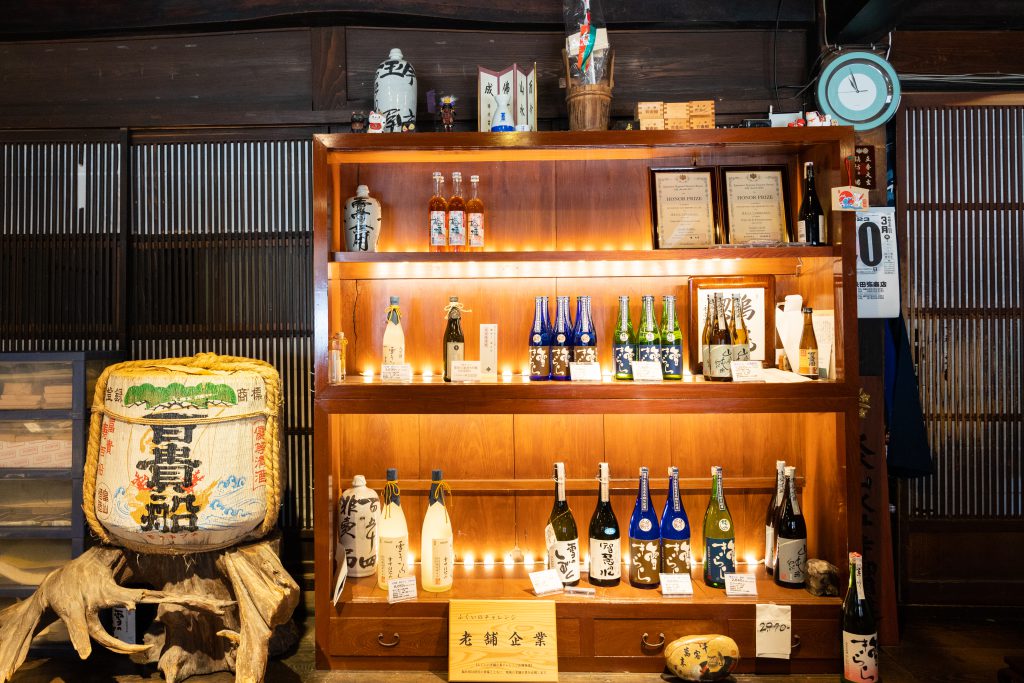
You can sample sake at the shop, and tours of the brewery are available by prior reservation outside of the brewing season from November to March.
——————————————————
Information:
Hatakeyama Sake Brewery
109-14 Imajo, Minami-Echizen-cho, Nanjo-gun, Fukui Prefecture
Tel: 0778-45-0028
Hours: 8am-7pm
Closed: varies
——————————————————
Zenroku Brewery by Kitazen Shoten
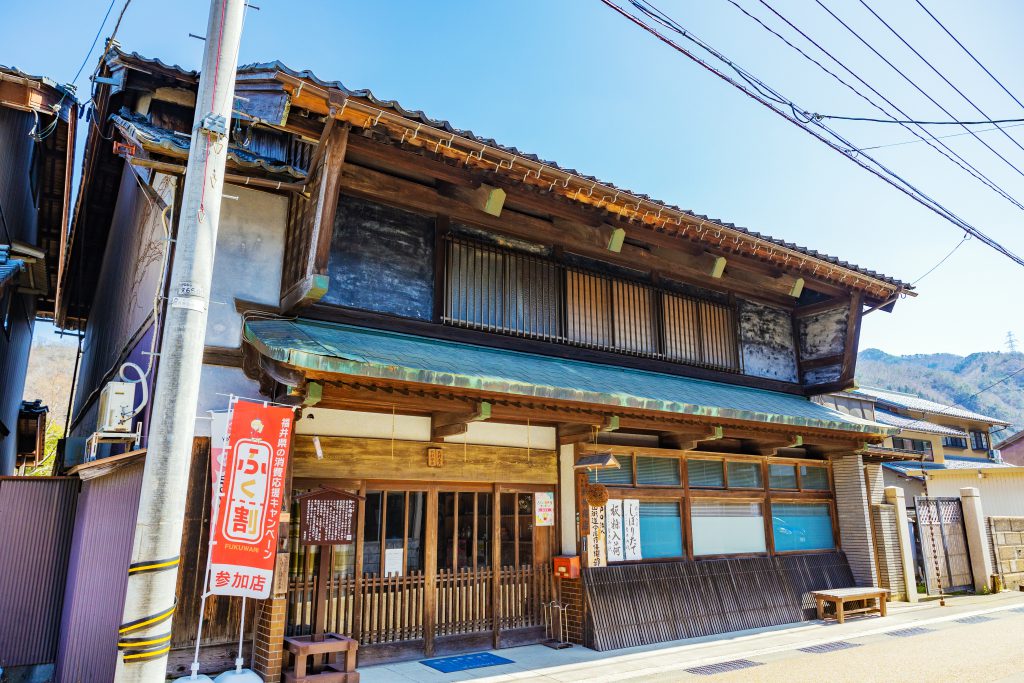
Handcrafted Technique and Heart in Every Drop
Founded in 1716, Kitazen Shoten, a brewery established by the Kitamura family, served as the Fukui domain’s official bill exchange, where travelers and merchants exchanged domain bills for gold and silver. The water used for brewing is naturally very soft, having been filtered through layers of silica rock on its way down from the snowy mountains that surround Imajo to the private well that lies forty meters underground. This clear water, along with Fukui’s own high-quality rice and the snowy country’s crisp climate and large temperature swings between day and night, combine to make this the perfect environment for sake brewing.
The koji determines the flavor, and the yeast determines the aroma. To make good sake, it’s important that the koji and yeast work in balance, says Kitamura Hiroyasu, the 10th generation and chief brewer. From making the koji to the final pressing, this family-run brewery draws on years of experience and sense at every step to create their smooth, dry, refreshing, and easy-to-drink sake.
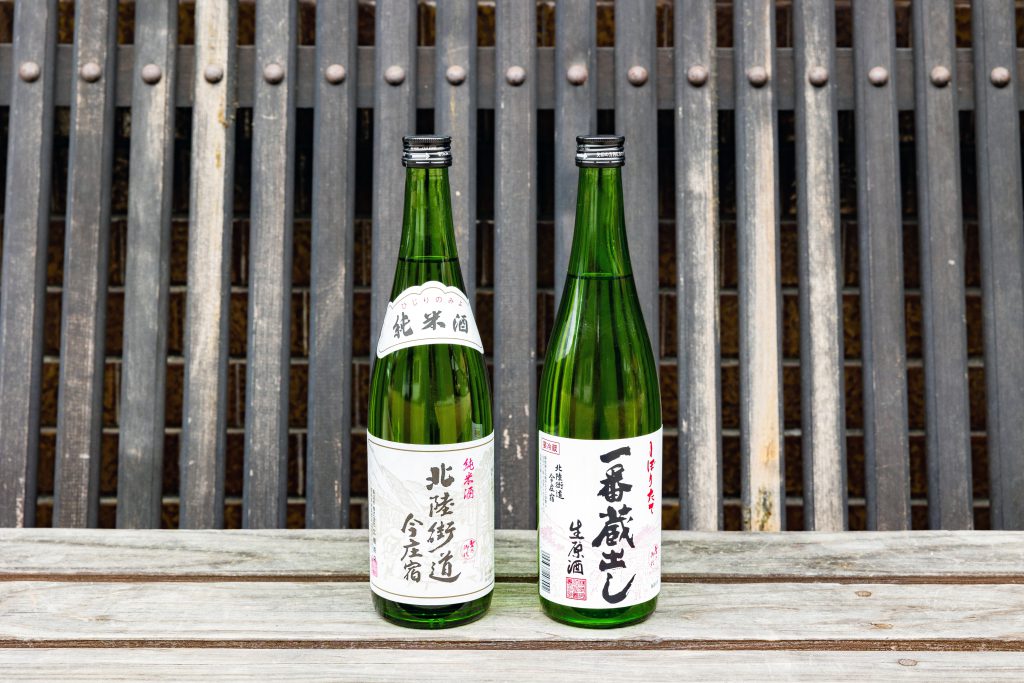
Hijiri no Miyo Junmai “Hokkoku Kaido Imajo-shuku” and freshly pressed “Ichiban Kuradashi,” an unfiltered nama sake with live yeast
The brand name “Hijiri no Miyo” is said to have been given by a high priest from Kyoto after the Second World War, praying for peace in this village of pure water. While enjoying this sake, your thoughts may drift to the relatively peaceful times we live in and the history of Imajo-shuku.
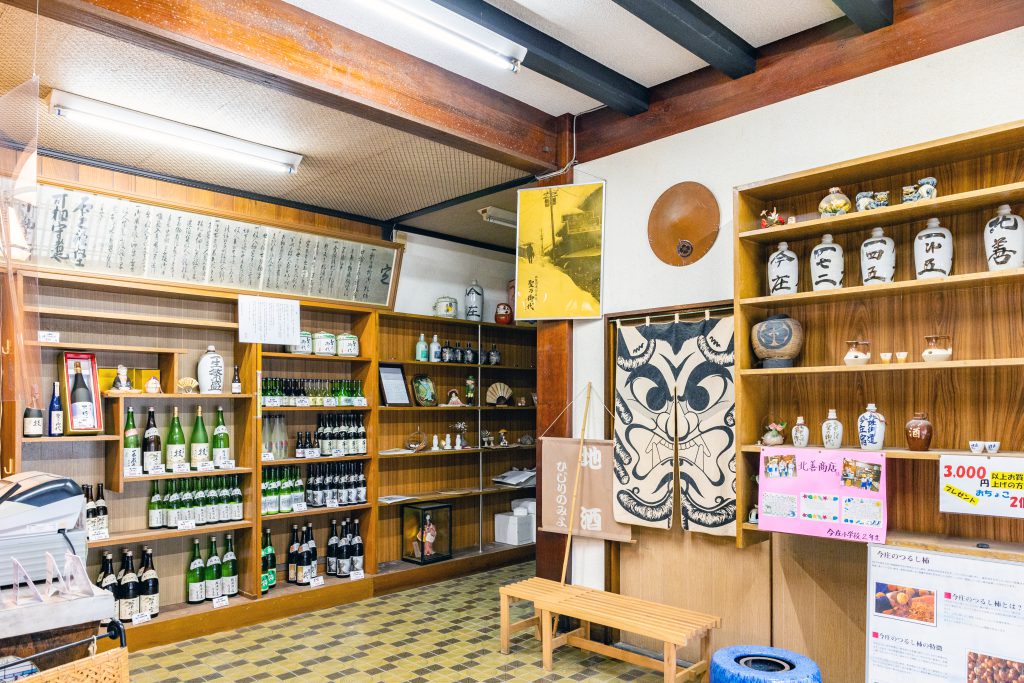
Along with all the sake made from the natural bounty of this snow country lining the shop walls, there are also earthen sake bottles bearing the name of the brewery. In the days before glass bottles were widespread, travelers and locals would visit the shop with their own bottles and buy by weight.
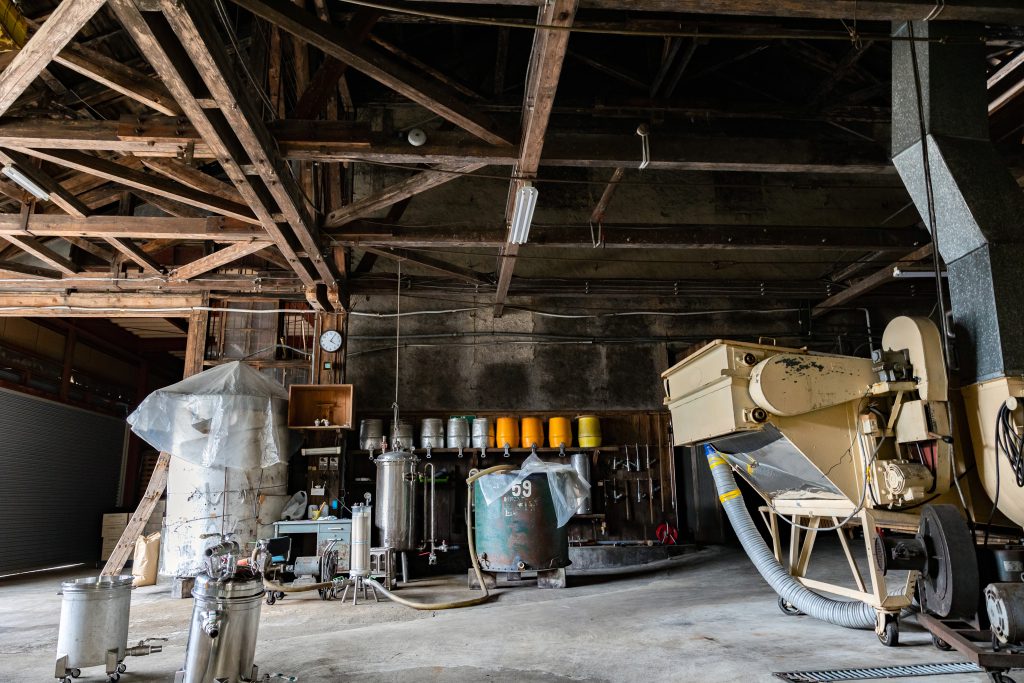
This sake brewery leaves a sense of nostalgia. With a reservation, you can tour the brewery and, of course, sample the sake.
——————————————————
Information:
Kitazen Shoten Co., Ltd.
81-3 Imajo, Minami-Echizen-cho, Nanjo-gun, Fukui Prefecture
Tel: 0778-45-0016
Hours: 9am-5pm
Closed: varies
——————————————————
Horiguchi Sake Brewery: Oldest in Fukui Prefecture, Founded in the Early Edo Period
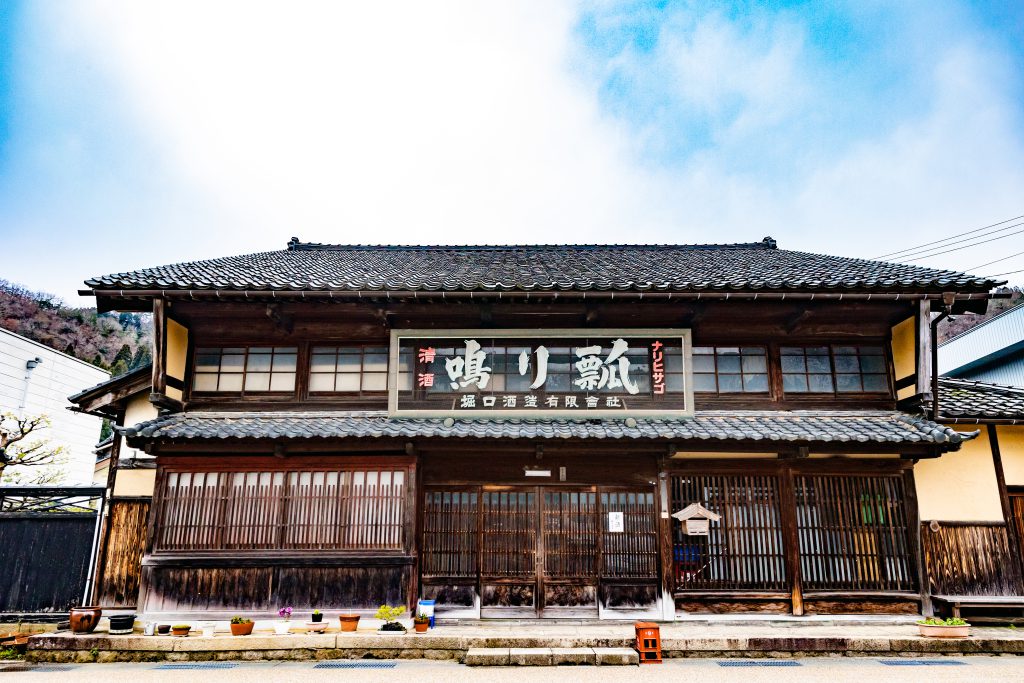
Local Sake that Gives You a Taste of the Landscape and Traditions
Founded in 1618, Horiguchi Sake Brewery’s long history and tradition, the oldest in Fukui Prefecture, dates back to its founding in 1618.
The family business is run by the current head brewer, Kohei Horiguchi, the 15th generation to do so. For all this time, they have been committed to using the local rice and water, which is perfect for sake brewing, and have cultivated traditional brewing methods.
He says that the sake made here has been nurtured by the environment, with the snow and clear air, the water purified by the silica in the surrounding mountains, this all influences the strength of the fermentation.
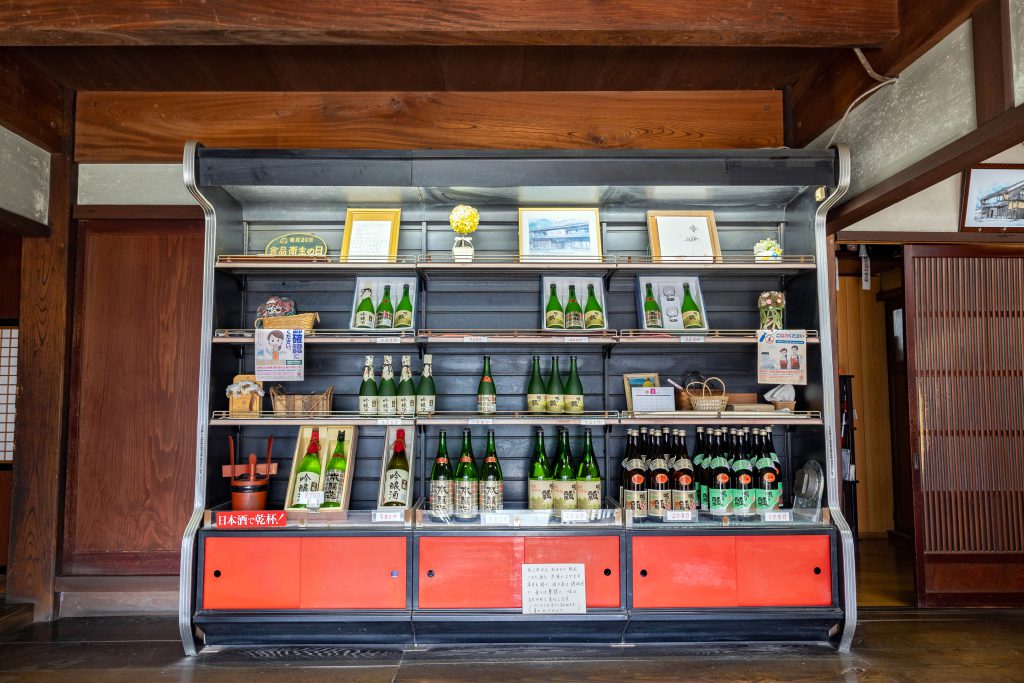
Horiguchi Sake Brewery mainly sells sake that is brewed almost entirely by hand and aged for five years. For generations, they have striven to create a light, dry, and refined taste with little acidity.
Like a secret sauce, we give it more room and wait for it to mature. Our sake goes well with a variety of dishes, from Japanese to Western cuisine, he says proudly.
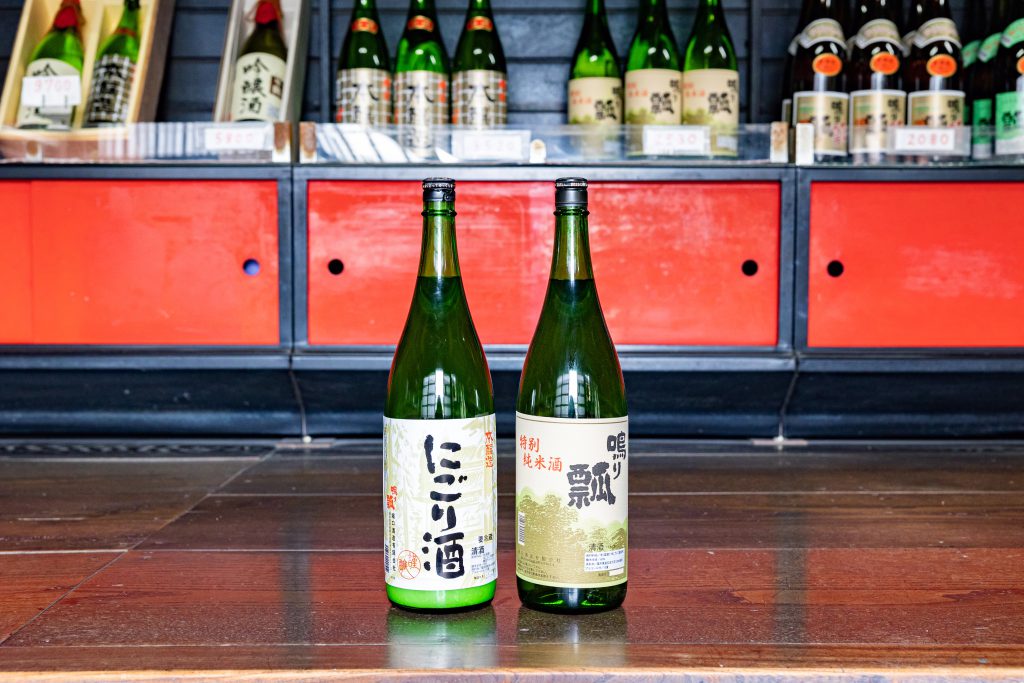
A selection of Horiguchi’s sake: the new “Nigorizake” and the special aged junmai, “Narihisago”
Narihisago was named after a line from a poem by Tachibana Akebono, an Edo period poet from Fukui. “Sake drips from the mouth of a gourd. A joyful sound.” “Narihisago” here means both a gourd sounding and bearing fruit. Savor this sake, passed down through the generations, along with the land that bore it.
——————————————————
Information:
Horiguchi Sake Brewery
76-1-2 Imajo, Minami-Echizen-cho, Nanjo-gun, Fukui Prefecture
Tel: 0778-45-0007
Hours: 9am-6pm
Closed: varies
——————————————————
Steeped in history, those who want to compare all four breweries in Imajo-shuku can try the “Tale of the Four Breweries.”
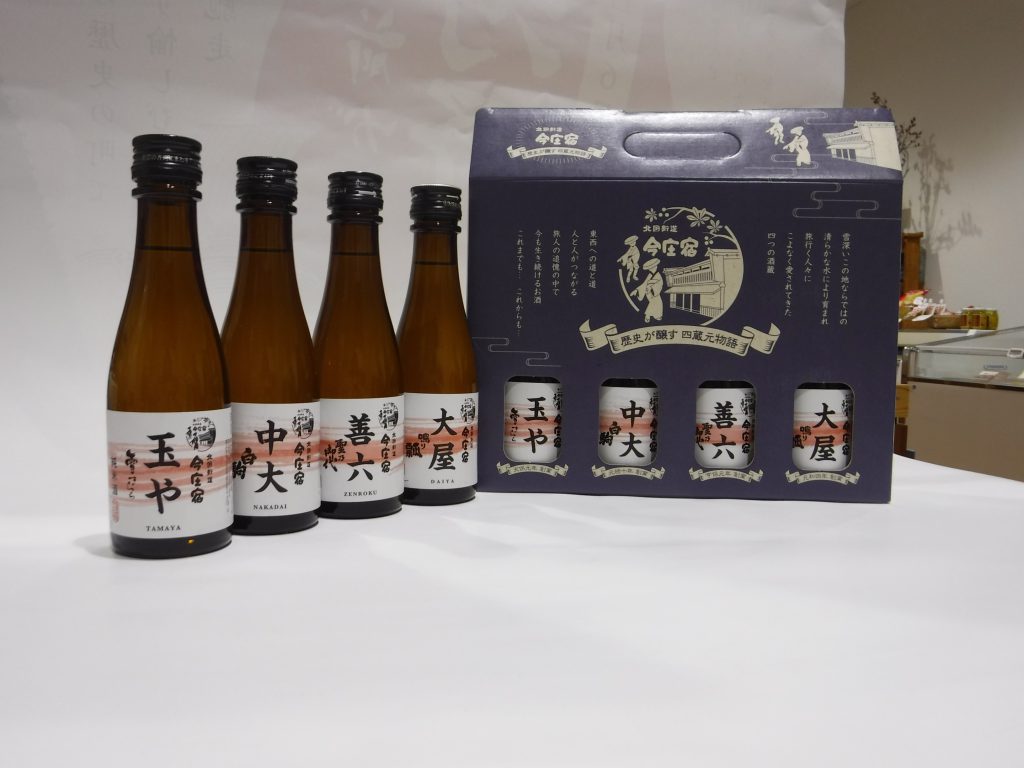
This set of junmai sake from each of the four breweries beloved in Imajo-shuku since the Edo period makes an excellent souvenir.
Enjoy the area’s representative sakes, such as “Yuki Kirara” from Hatakeyama Sake Brewery (Tamaya), “Hijiri no Miyo” from Kitazen Shoten (Zenroku), “Narihisago” from Horiguchi Sake Brewery (Oya), and “Hakukoma” from Hakukoma Sake Brewery (Chudai).
You can compare the different varieties all at once, or take your time to savor each them! We recommend this as a great souvenir from your trip to the town of fermentation. Don’t miss the fine sake born and cultivated in Imajo-shuku. You can purchase it at the souvenir shop at Imajo Station and at the Minami-Echizen Sankairi Roadside Station.
——————————————————
Information:
Imajo Station Souvenir Shop
74-3-1 Imajo, Minami-Echizen-cho, Nanjo-gun, Fukui Prefecture
Tel: 0778-45-0074 (Imajo Tourism Association)
Hours: 9am-5pm
Closed: open year-round
https://www.imajo-syuku.com/売店おすすめ土産/
Information:
Minami-Echizen Sankairi Roadside Station MARKET Me
39-2-2 Makidani, Minami-Echizen-cho, Nanjo-gun, Fukui Prefecture
Tel: 0778-47-3690
Hours: 9am-8pm
Closed: open year-round
—————————————————
After making your rounds of the sake breweries, you can also try your hand at brewing sake yourself and learn more about this interesting process of nature.
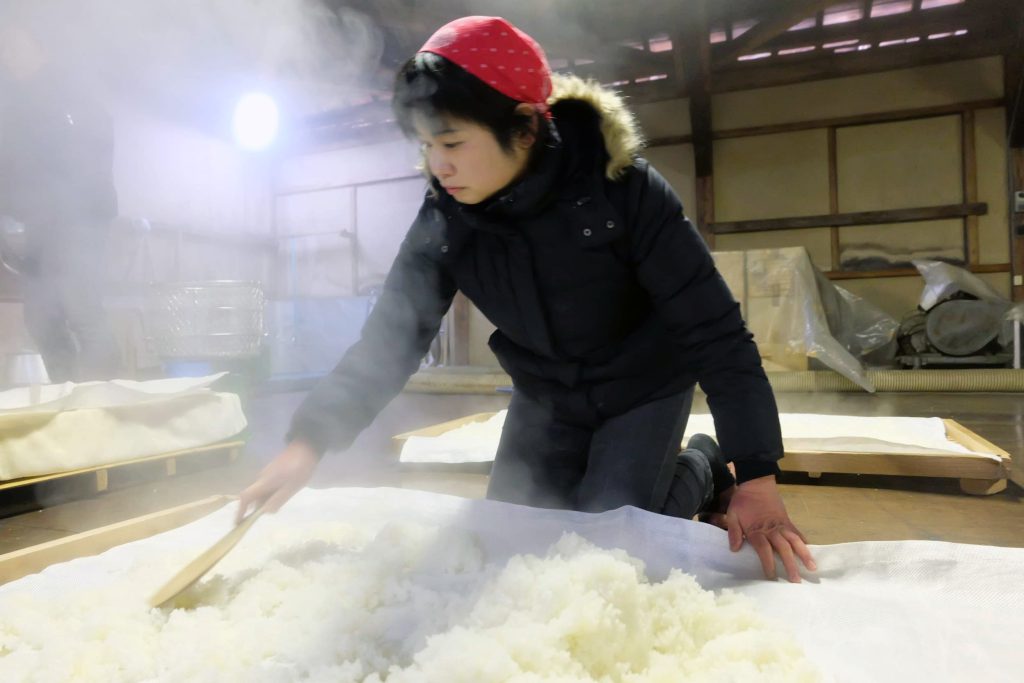
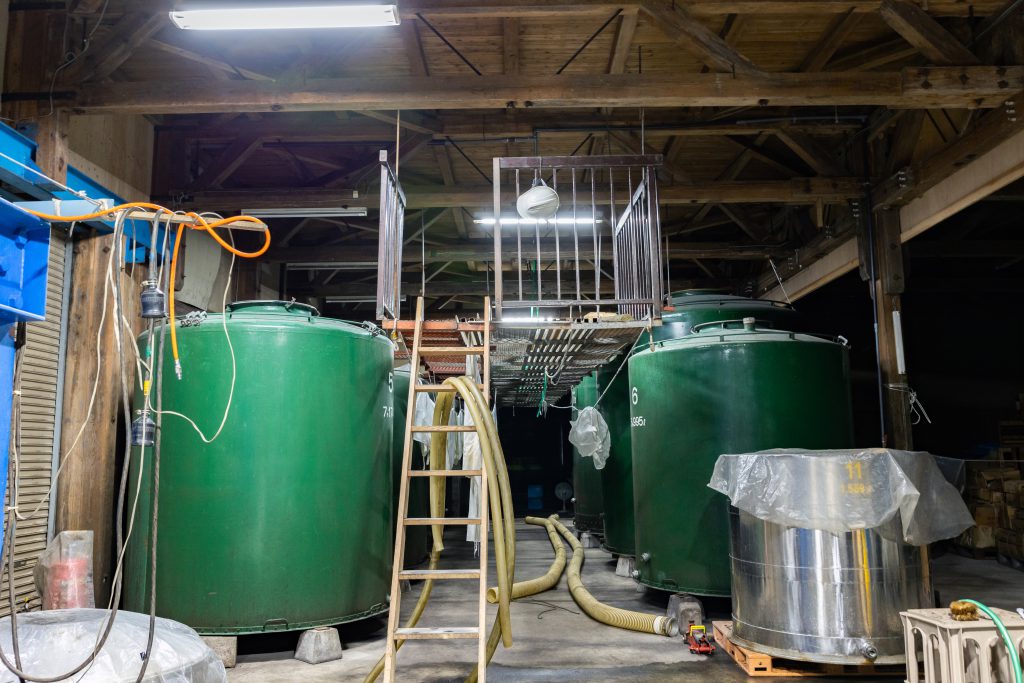
At breweries in Imajo-shuku, you can get a hands-on brewing experience every year from November to the end of February (except December).
Experience firsthand the magic of fermentation and the art of sake brewing unlike what you can find anywhere else.
You have the option to participate for just one day, but we recommend four days, allowing you to experience the entire process.
Information and inquiries:
Tamamuraya
82-10 Imajo, Minami-Echizen-cho, Nanjo-gun, Fukui Prefecture
*Inquiries accepted via online form *Reservations accepted online
Yoshigo Shoten: Miso Store Founded Long Ago
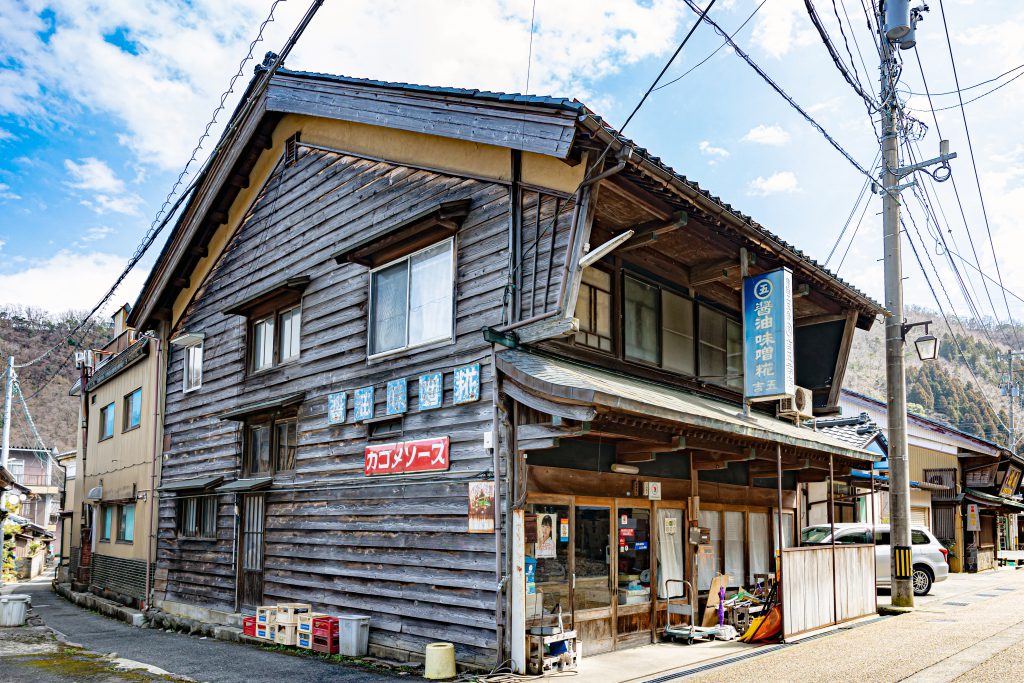
Time and Effort: Miso Naturally Brewed in Wood Barrels
Founded in 1900, Yoshigo Shoten produces and sells its home-brewed miso. To deliver the same delicious taste every time, the company maintains traditional methods handed down from generation to generation. Every part of the process, from making the koji, boiling the soybeans, and preparing ingredients, to fermentation and maturation, all are carried out by hand by craftsmen.
The soybeans used as the raw material are mainly from Fukui Prefecture, and although the rice varies depending on the season, much of it is locally grown. Yoshigo Shoten is particular about brewing in wooden barrels and long-term natural fermentation. Temperature difference is important for the koji to grow and the miso to ferment, but Yoshida Ryoji, the fourth-generation owner with about 40 years of miso making experience, says, “Our brewery has no heating or cooling facilities, and we brew at natural temperatures without adjusting the temperature. I think it’s only because we’re in Imajo that we can ferment naturally and produce this flavor.”
The wooden barrels and storehouse have been carefully protected for over 120 years. In them, the ecology of microorganisms such as yeast and lactic acid bacteria that create the flavor profile have taken up residence over the years. The miso matures and ferments in these wooden barrels for about one to one and a half years, or up to two years.
After putting it in the barrels and making sure to remove all the air, we close the lid and place stone weights on top, and then we leave it to the microorganisms, says Yoshida. The depth and breadth of flavor, the body and aroma of the finished product can only be achieved in these wooden barrels. Yoshida continues to pour himself into his miso, “Our miso is alive.”
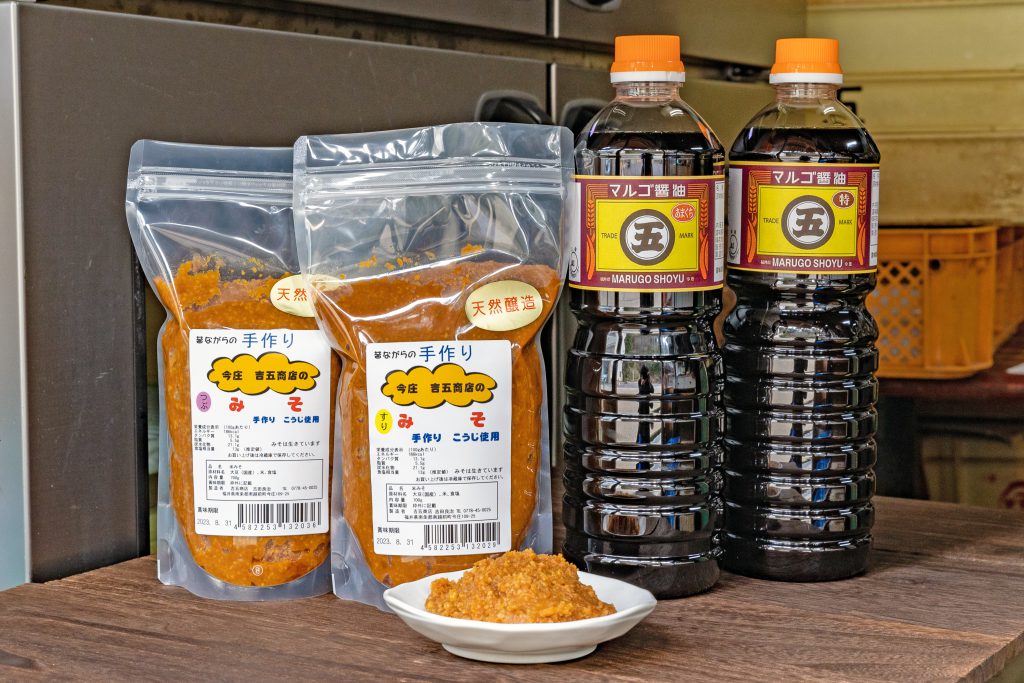
They have two types of traditional miso, tsubu and suri, which are made with plenty of rice malt. They also sell five types of soy sauce and also make and sell tofu, deep-fried tofu, and malt.

They also sell fresh miso by weight. It has a mellow aroma and a clean, traditional taste that allows you to enjoy the natural soybean flavor. It contains no preservatives, additives, or colorings.
——————————————————
Information:
Yoshigo Shoten
109-25 Imajo, Minami-Echizen-cho, Nanjo-gun, Fukui Prefecture
Tel: 0778-45-0025
Hours: 9am-7pm
Closed: varies
——————————————————
Takano Yuhei Shoten: A Plum Paste Specialty Store with a Long History
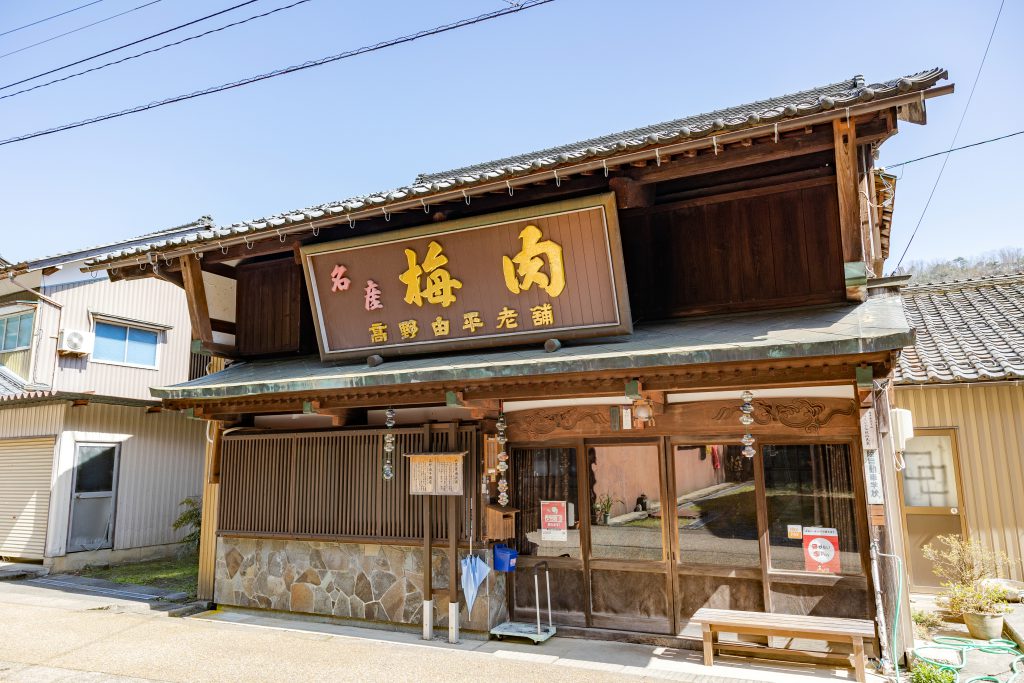
A Time-Honored Product that Has Been Loved for Over 300 Years
The last stop on our mini fermentation journey is Takano Yuhei Shoten, with its large, eye-catching large sign reading “bai niku” (plum paste), which has been producing “kanro bai niku” (sweet plum paste) since the Edo period. It is said that the origins of this product date back to when the Takano family operated an inn called Daikokuya Yoshibei, where they processed Nishida plums from Wakasa that the lord of Obama Domain in Wakasa Province had brought as a souvenir and served them to travelers who stayed at their inn. The heads of the family have preserved their methods for generations, striving to maintain the original taste.
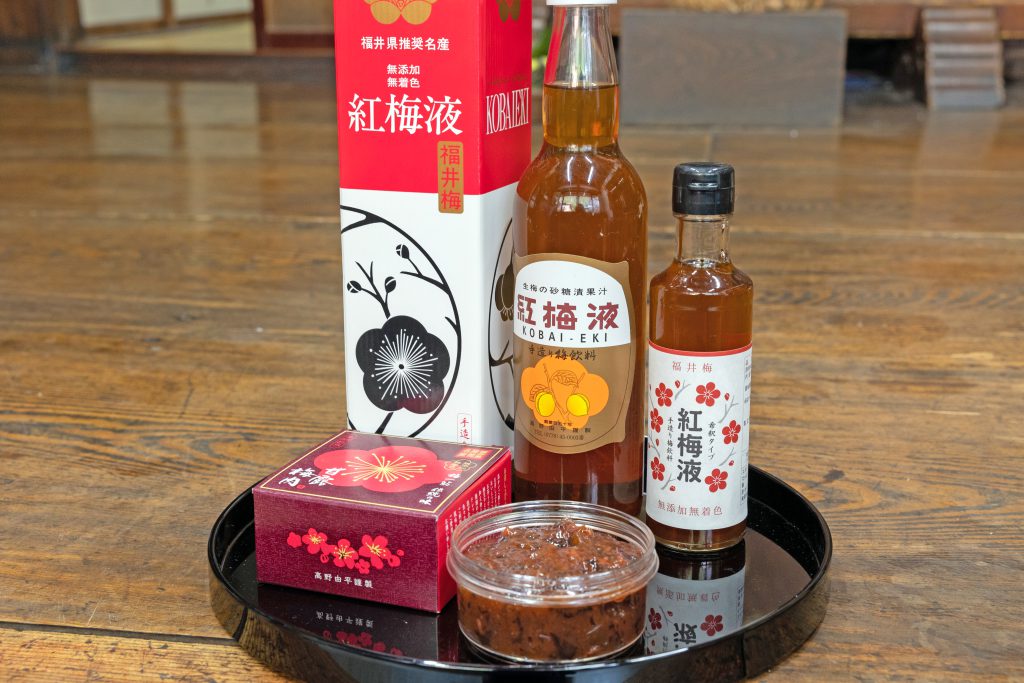
Sweet plum paste and red plum juice
Apparently, natural plum yeast continues to live in this plum paste.
After about a month of preserving the plums in sugar, you can hear the popping sounds of fermentation throughout the brewery. It starts to bubble, says Yoshiaki Takano, the tenth-generation owner.
The storehouse contains about 80 Echizen-yaki plum jars and pots that have been used since the Edo period. It was in 2010 that plum yeast was extracted from the plum flesh that has a long history. A professor from the research group at Fukui Prefectural University who extracted the plum yeast commented that “this storehouse is home to good, natural yeast.”
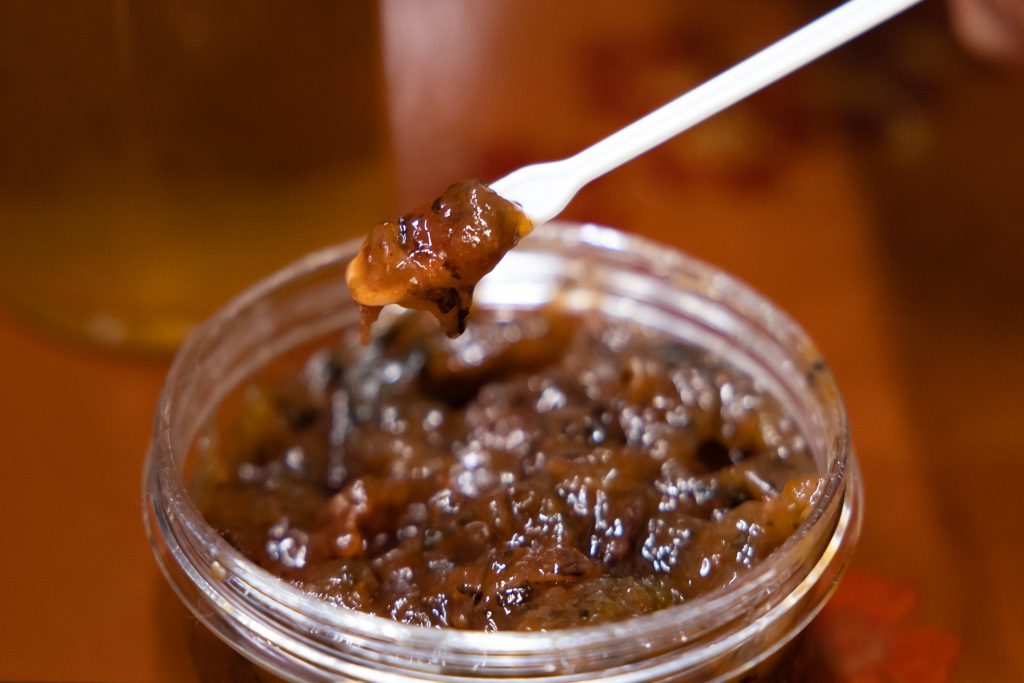
Their storehouse contains about plum jars and other pots, made from the famous 80 Echizen-yaki pottery, that have been in use since the Edo period. While their history with bai niku is long, it was not until 2010 that plum yeast was extracted from their paste. A professor from the research group at the Fukui Prefectural University who extracted the plum yeast said that the storehouse is “home to good, natural yeast.”
The climate of Imajo is perfect for making delicious plums, says Takano. The focus lies squarely on preserving that which has been passed down through the family: commitment to tradition, ingredients, and manufacturing methods. The flavor that started as form that famous Japanese hospitality for travelers will surely continue to delight many people in the future.
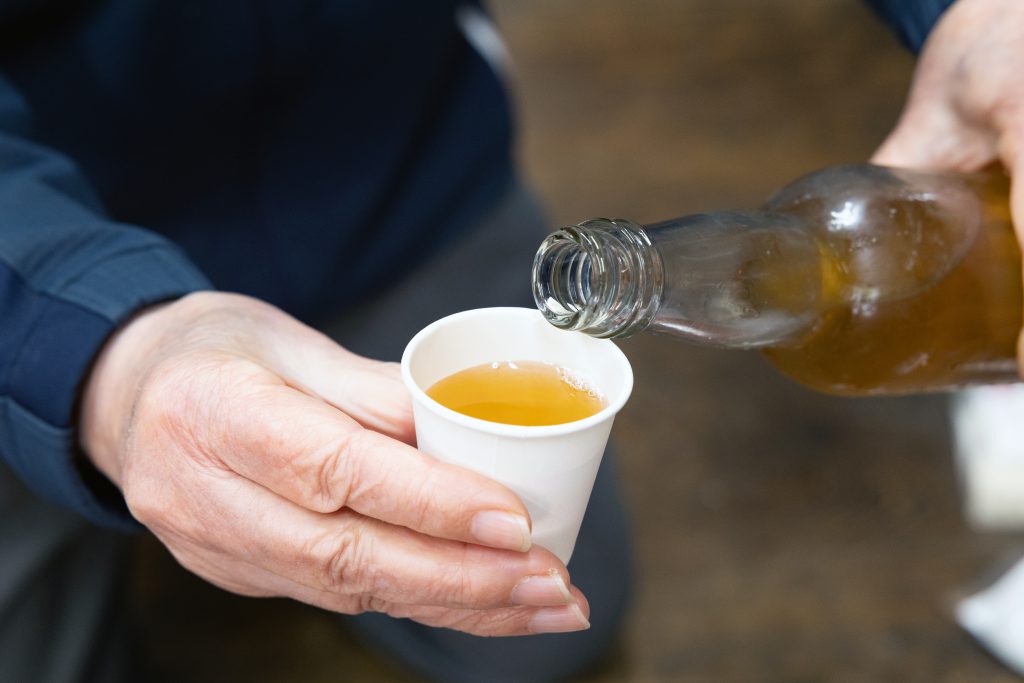
You can sample both the plum paste and the plum juice before deciding on your purchase.
——————————————————
Information:
Takano Yuhei Shoten
109-17 Imajo, Minami-Echizen-cho, Nanjo-gun, Fukui Prefecture
Tel: 0778-45-0003
Hours: 8am-6pm
Closed: varies
——————————————————
The best way to experience fermented foods is to visit the place and experience it with your own eyes, ears, and taste.
If you find fermented foods interesting, be sure to visit Imajo-shuku and try some. Enjoy delicious food, heal yourself in the abundant nature, and take a leisurely stroll through the historic streets. You will surely feel rejuvenated in both spirit and body.


